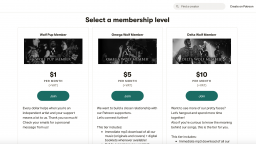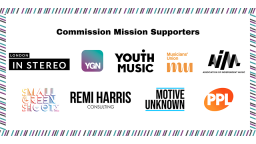
As it’s now possible to monetise online networks, there is no longer the same pressure to have a record deal or a coveted support slot to turn music into a steady income.
Written by Eloise Bulmer, as part of Commission Mission.
Social media has become increasingly important for musicians over the last decade, both as a tool for building an audience and as a way to prove you're worth investing in. But once you've got an audience eager for your content, how can you turn that into continuous investment? Previously, the true value of a fanbase lay in local communities and networks which could then be expanded worldwide into chart-topping albums and sell-out tours; now, musicians are finding ways to monetise sprawling online communities. From crowdfunding to streaming, here are just some of the ways musicians are turning the internet into an income.

Patreon is an increasingly popular way for artists to generate an income from their fanbase. This membership-based platform allows musicians to offer perks to fans who want to support them financially. These rewards are on the musician's terms and subscriptions are monthly, ensuring a rolling income. By becoming Patrons, fans give their favourite musicians the means to continue creating the content they love directly, instead of just buying an album or a gig ticket.
Christina Rotondo, a Nottingham-based musician who uploads covers of rock and pop-punk songs to her YouTube channel, ends each of her videos with a screen full of the names of her 73 Patreon supporters to thank them for continuing to invest in her and her music. Rotondo herself has tweeted that “in reality I wouldn’t be able to create, discover and share without my Patreons.” Split across tiers, her Patreon perks include a private Discord chat with the artist and other fans, early access to videos, and feedback on fans’ music projects from Rotondo herself. The Patreon website says it best: "creators retain creative freedom while getting the salary they deserve, and fans get to rest easy knowing that their money goes directly towards creating more of what they love."

As it’s now possible to monetise online networks, there is no longer the same pressure to have a record deal or a coveted support slot to turn music into a steady income – online networks can bridge that gap for touring artists. Italian pop-rock act Halflives are very much a live band, but they have also turned their 10,000 Facebook fans and 20,000 YouTube subscribers into a monthly income through their Patreon. Launched in September 2019 it now brings in $1331 per month from 77 supporters. In many ways it's a throwback to fan clubs of the past, except this time they're not mediated by a record label or manager, meaning fans’ contributions go straight to the band. If you have people following your social platforms or your tours then you have an audience who want to invest in you.
As we've seen with the likes of BTS and One Direction, a fandom really can make or break an artist, and turning that fervour into a monetary contribution can make all the difference when it comes to pursuing music full-time – no matter how small that contribution is. An alternative to Patreon is Ko-fi, which runs on a similar premise: supporting creators for the price of a coffee or, in other words, a small tip. Unlike Patreon, there's no pressure to provide a range of perks as fans can just make one-off donations which get paid directly to you, and Ko-fi doesn't take a fee. However, if you are looking to offer monthly subscriptions, perks and commissions this is possible through a paid upgrade to Ko-fi Gold which offers these benefits amongst others, as well as the option to swap out coffee for another beverage – exciting!
Maybe the idea of a monthly subscription service is too intimidating – how about asking your audience to fund a one-time project? London-based punk band The Tuts used the now defunct PledgeMusic to fund their 2016 album 'Update Your Brain', exceeding their goal and using the extra contributions for music videos and photoshoots. It was a win-win situation: the band received an advance payment which they used to book studio time, and their fans got to listen to an album from an independent band they love, and know that their principles hadn't been compromised to make it happen. In an interview with The Unsigned Guide the band stated: "We’re thankful to have a loyal fan base that allows us to be DIY because it’s their support that is enabling this to happen. I love being DIY because it’s 100% our input, ideas and creations," highlighting the sweet spot bands are able to occupy by monetising their online networks. Although PledgeMusic no longer exists, the same can be achieved through platforms like Crowdfunder, Kickstarter and even Twitch.
A great example of the latter is soul-pop musician Raquel Lily, who uses live-streaming platform Twitch to drive an income from her online network. Widely known for hosting gamers, Twitch is also home to a wealth of musicians who are building communities and bringing in a regular income. Viewers can support in a variety of ways: paying to subscribe to their favourite streamers, tipping using Twitch's own currency of 'bits', or just donating to the streamer directly.
As Lily acknowledges: "Twitch opened up my music to the world and propelled me to another level, for sure," and the ease with which her 40,000+ followers can support her financially has allowed her to fund all sorts of projects through streaming. "I have community driven goals which help people stay engaged and interested in what I do. For example if I want to make a music video, I set up a goal for my community to help me fundraise for it. It is sort of like a Patreon, but live." In such fundraising streams the video feed is overlaid with a constantly updating fundraising goal bar, often marking milestones on the way to that goal. For example, a streamer might be raising £5,000 to record an album, but reaching £1000 in donations could unlock a popular fan-requested stream or a giveaway as a way of thanking fans for their generosity and encouraging further donations. This support allowed Lily to record her album, a process which her fans have been very closely involved in as she regularly streamed studio sessions and invited her community to share their opinions and get involved: “I felt like it was only right for them to be a part of the making of what they helped pay for.”
If you're still growing your audience and not ready to consider any of the above just yet, consider starting a mailing list in the meantime. Once you decide to start a fundraiser or subscription service, you'll already have a list of people who are interested and you'll be able to easily and effectively let them know. Another benefit of running your own mailing list is that it's entirely yours – it's not dependent on a social media platform. Make sure you collect email addresses with explicit consent; your sign-up page must include a clear 'opt-in' tick box for your newsletter and any other ways you may use their data, as well as a clear option to unsubscribe and opt out at any point. Mailchimp can be a good place to start, as they offer a free service for up to 2,000 contacts – just remember if you end up moving services at any point all your contacts will need to reconfirm their subscription which means you could lose a portion of your email list.
The internet has made it easier than ever to reach people all over the globe, but making an impression and driving a regular income are very different things. With so much investment into social media advertising and so little return on music streaming services, once musicians have these audiences it's important they know how to turn that into financial support. Generating this support online has never been easier thanks to websites like Patreon, Ko-fi and Twitch. As Raquel Lily sums it up: "I think it's a beautiful thing. You no longer have to be a road warrior or a signed artist to make a living. Now more than ever, people's careers are at their literal fingertips."

Commission Mission was created by Young Guns Network and London In Stereo to commission 20 new and experienced freelance writers to create articles to inspire, inform and entertain young people in the music industry who are struggling during Covid-19.
The supporters who made this project possible were Association of Independent Music, London In Stereo, Musicians Union, Motive Unknown, PPL, Remi Harris Consulting, Small Green Shoots, Young Guns Network, Youth Music
